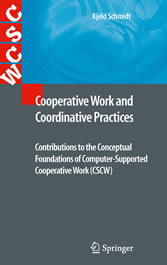Suchen und Finden
Mehr zum Inhalt

Cooperative Work and Coordinative Practices - Contributions to the Conceptual Foundations of Computer-Supported Cooperative Work (CSCW)
Preface
6
Acknowledgments
9
Contents
11
Part I Progress Report
12
1 Cooperative Work and Coordinative Practices
13
1 The Road to CSCW
14
2 The Concept of Cooperative Work: The Mundane Case of Moving
17
3 Strategic Distinctions
20
4 Coordinative Practices: From 'Coordination Mechanisms' to 'Ordering Systems'
24
4.1 Coordination Mechanisms in Practice
25
4.2 Understanding Computational Coordination Mechanisms
26
4.3 Coordination Mechanisms Reconsidered
27
4.4 Ordering Systems
31
5 CSCW's Radical Program
33
6 For Lack of a Conclusion
36
Part II Surveying the Connections
38
2 Riding a Tiger, or Computer-Supported Cooperative Work (1991)
39
1 The Emergent Nature of Cooperative Work
39
2 The Dialectics of Cooperative Work
42
3 The Precarious Use of Models in CSCW
46
3 Taking CSCW Seriously: Supporting Articulation Work (1992)
53
1 Some Background
54
2 A Conceptualization of CSCW
55
2.1 The Approach of CSCW: Computer Support
56
2.2 The Scope of CSCW: Cooperative Work
58
2.2.1 The Nature of Cooperative Work
58
2.2.2 The Rich Diversity of Cooperative Work
60
2.2.3 Articulation Work
63
2.3 Why CSCW Now?
65
3 Supporting Articulation Work
67
3.1 Supporting the Management of Workflows
67
3.2 Supporting the Management of a Common Information Space
71
3.2.1 The Role of Interpretation Work
71
3.2.2 The Distributed Nature of Cooperative Work
75
4 Conclusion
79
4 The Organization of Cooperative Work (1994)
80
Beyond the ‘Leviathan’ Conception of the Organizationof CooperativeWork
80
1 The Problem
80
2 The 'Leviathan' Approach to Organizational Theory
83
2.1 Commons
83
2.2 Coase
84
2.3 Williamson
86
3 Critique of the 'Leviathan' Approach
87
4 Beyond the 'Leviathan' Approach
90
4.1 Perspectives of a 'Cooperative Work' Approach to Organizational Theory
90
4.1.1 Cooperative Work Arrangement
91
4.1.2 Work Organization
94
4.1.3 Formal Organization
95
4.1.4 Firm, Network…
96
5 Conclusions
97
5 Coordination Mechanisms (1996)
99
Towards a Conceptual Foundation of CSCW SystemsDesign
99
1 The Issue of Articulation Work
100
2 The Complexity of Articulation Work
102
3 Coordination Mechanisms: Evidence and Concept
106
3.1 Coordination Mechanisms: The Protocol
109
3.2 Coordination Mechanisms: The Artifact
119
3.3 Coordination Mechanisms: Alignment
123
4 Computational Coordination Mechanisms
125
4.1 Malleability
127
4.2 Linkability
129
5 In lieu of a Conclusion: The Ariadne Notation
131
6 Of Maps and Scripts (1997)
138
The Status of Formal Constructs in Cooperative Work
138
1 Determining the Meaning of Formal Constructs
140
2 The Problem of Generalization
142
3 Maps and Scripts
146
4 The Crucial Role of Artifacts
151
5 Conclusions
153
7 The Critical Role of Workplace Studies in CSCW (2000)
154
8 The Problem with 'Awareness' (2002)
162
9 Remarks on the Complexity of Cooperative Work (2002)
172
1 The Puzzle of 'Cooperative Work'
172
2 Taking Serious Work Seriously
174
3 The Problematic Concept of Complexity
178
4 A Systemic Conception of Cooperative Work
186
5 The Complexities of the Common Field of Work
190
6 The Complexities of the Cooperative Work Arrangement
192
7 The Complexities of Articulation Work
197
10 Ordering Systems (2004)
205
Coordinative Practices and Artifacts in ArchitecturalDesign and Planning
205
1 Introduction
205
2 The Complexity of Architectural Work
209
3 A Plethora of Representational Artifacts
211
3.1 Conceptual Visualizations
213
3.2 The System of CAD Plans and Drawings
216
3.3 And so on…
218
3.4 Representational Artifacts as Objectifications
218
3.5 Notations: Standard and ad hoc
220
4 Coordinative Practices and Artifacts
222
4.1 Plan Identification
223
4.2 The Plan Identification Code and Circulation List
225
4.3 The CAD Layer Organization
228
4.4 The Component Catalogue
231
4.5 The Detail Drawings: The Identification Code and List
232
4.6 The Binder System
235
5 The Clustering of Coordinative Practices
236
6 Interlude: The Specificity of Coordinative Practices
240
6.1 The Intellectualist Legend
240
6.2 Practices of Categorization and Classification
244
6.3 Technologies of The Intellect
247
6.4 'Crude Written Techniques' As Members' Practices
249
7 The Economy of Ordering Systems
251
8 The Challenge of Ordering Systems For CSCW
254
Part III CSCW Reconsidered
256
11 Formation and Fragmentation
257
1 Cornerstones: The Concepts of 'Practice' and 'Technology'
260
2 Computing Technologies and Cooperative Work
276
2.1 Division of Labor: Progressive Forms of Work Organization
277
2.2 Machinery: The Issue of the Control Function
288
2.3 The Universal Control System: The Stored-Program Computer
298
2.4 Origins of Computing Technologies in Cooperative Work
302
2.4.1 Division of 'Mental Labor'
302
2.4.2 Mechanization of 'Mental Labor'
309
2.5 Facilitation of Cooperative Work: Real-Time Computing
314
2.5.1 Project Whirlwind
314
2.5.2 The Whirlwind Legacy
320
2.5.3 Interactive Computing
323
2.5.4 The Arrested Growth of Interactive Computing
325
2.5.5 Interactive Computing and the Cybernetic Notion of 'Human-Computer System'
331
2.6 Facilitation of Articulation Work: Computer-Mediated Communications
332
3 The Formation of CSCW
336
3.1 Proto-CSCW: 'Computer-Mediated Communications'
337
3.2 The Crisis of the Message-Handling Paradigm
341
3.3 Automation of Articulation Work: 'Office Automation'
343
3.4 The CSCW Research Program
345
3.5 Technology and Ethnography: An 'Odd Mix'?
348
4 Accomplishments and Shortcomings
350
4.1 Ethnography and Technology: A 'Big Discrepancy'?
351
4.2 The Case of 'Awareness Engines'
353
4.3 Logics of Fragmentation
358
12 Frail Foundations
360
1 Suchman vs. Cognitivism
361
1.1 Suchman's Strategy
364
1.2 Counter-Cognitivism
367
1.3 Transcendental Judgments
369
1.4 Regularity and Normativity
372
2 Work and Interpretation Work
377
2.1 Garfinkel (Mis)interpreted
378
2.2 Sources of the Interpretation Myth in Sociology
382
3 The Consequences of Counter-Cognitivism
384
4 The Problem of Computational Artifacts
388
13 Dispelling the Mythology of Computational Artifacts
391
1 Computational Artifacts, or Wittgenstein vs. Turing
393
1.1 Foundations Lost
393
1.2 Turing's Ambiguous Machine
400
1.3 Conceptions of the 'Mechanical'
402
2 Room for CSCW
409
3 The Practical Inexorability of CSCW
411
References
414
Index
457
Alle Preise verstehen sich inklusive der gesetzlichen MwSt.











